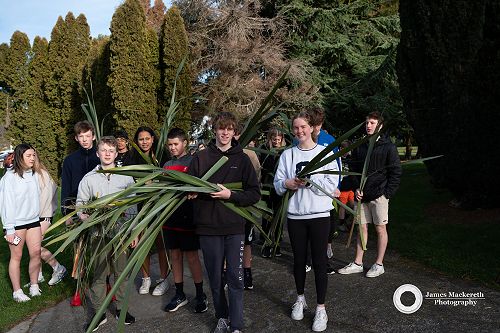We are thrilled to share the resounding success of our recent Matariki Festival hosted here at Te Hato Petera (St. Peter’s College). The event, held last Wednesday 19th of July, was a vibrant and exciting day that allowed our school community to come together to celebrate the Māori New Year and honour the significance of Matariki. We were privileged enough to have experts come in and aid in many of the stations which made for an engaging, fascinating day.
The day was filled with a variety of activities that were exciting for all, and even better, served as educational experience about Te Ao Māori (Māori World View), Tikanga Māori and Mātauranga Māori (Māori Culture and Māori knowledge. This is a brief overview on a few of the stations that we had around our kura (school) that made the inaugural day unforgettable-
1. Harakeke Weaving
Guided by skilled experts Lucy, Roseanne, Nanny Kay, Sharon and Robyn, ākonga (students) and kaiako (teachers) alike learned the art of weaving, using harakeke to create intricate and beautiful pieces. Some students made ika (fish), some made puawai (flowers) and others made much more complex pieces. This specific workshop had plenty of kaiako to guide our tamariki (children), which made for a successful station.
2. Pounamu Display
A mesmerising display of Pounamu showcased the rich cultural significance of the precious gemstone to the Māori People. We were privileged enough to have local Gavin Thompson come in with an array of his stunning pieces and tools to display. His variety of pounamu were all very unique and he often had a memorable story to tell with each piece. Gavin and his whanau also had pounamu for sale throughout the day, where members of our community were able to come in and purchase them. Students had the opportunity to learn of the cultural significance on Pounamu and the spiritual connections associated with it.
3. Ki-O-Rahi
Students had the opportunity to participate in Ki-O-Rahi, a traditional Māori ball game. Besides the game itself being very fast paced and enjoyable, it also carries cultural significance, reflecting Māori values, traditions, and strategic thinking. Ki-O-Rahi promotes fitness, fosters teamwork, and upholds the traditional Māori game.
4. Kite Making
A smaller group of students opted for the kite-making class. These students were privileged enough to learn how to make traditional manu tukutuku (kites). They used simple materials such as harakeke (flax) and toi toi. Traditionally, the manu tukutuku were flown on special occasions such as the Matariki and the Māori New Year. This class was very successful, having produced some beautiful kites that most could be seen being flown around Kura in the afternoon.
5. Kai
No Matariki celebration would be complete without Kai. Luckily for us, the foods room was operating as a Whare-Kai, where students had the opportunity to make their own fry-bread.
In addition to this, every student was supplied kai at lunch time to further engage in the unity that comes from Matariki.
These examples were just a fraction of what was happening in our Kura during this celebration. We also had classes teaching poi-making, rakau, ukulele and film-watching. This day was undoubtingly a success, as evidenced by the smiles of students, staff and experts throughout the celebration. The Matariki festival not only enriched our understanding of traditional Māori ways, but also reinforced the importance of cultural diversity within our Kura and community.
We would like to extend our heartfelt gratitude to those that organised and gave up their time for this successful day. Thank you to Sylvia and Yvonne for coming in to teach ukulele to our akonga. We also thank the teachers, students and community that contributed their time, energy, and knowledge to make our Matariki memorable. It is through events like this that strengthen our school community and uplift inclusivity and cultural diversity.
As we reflect on the success of this celebration, we look forward to the future events that will continue to nurture the diverse and vibrant environment that we call school!
Ngā Mihi,
Mareikura – Dixie Burr and Courtney Scanlan.





